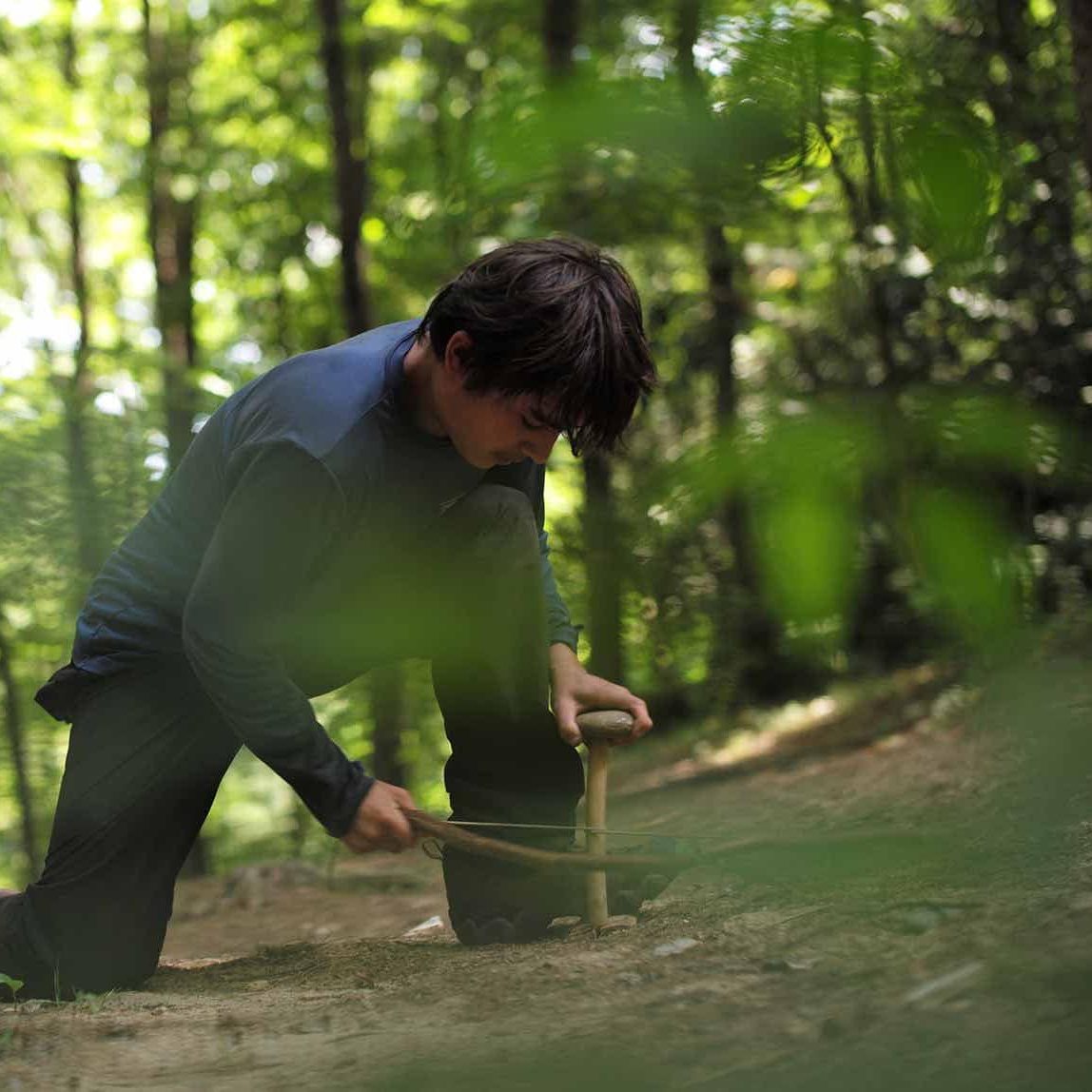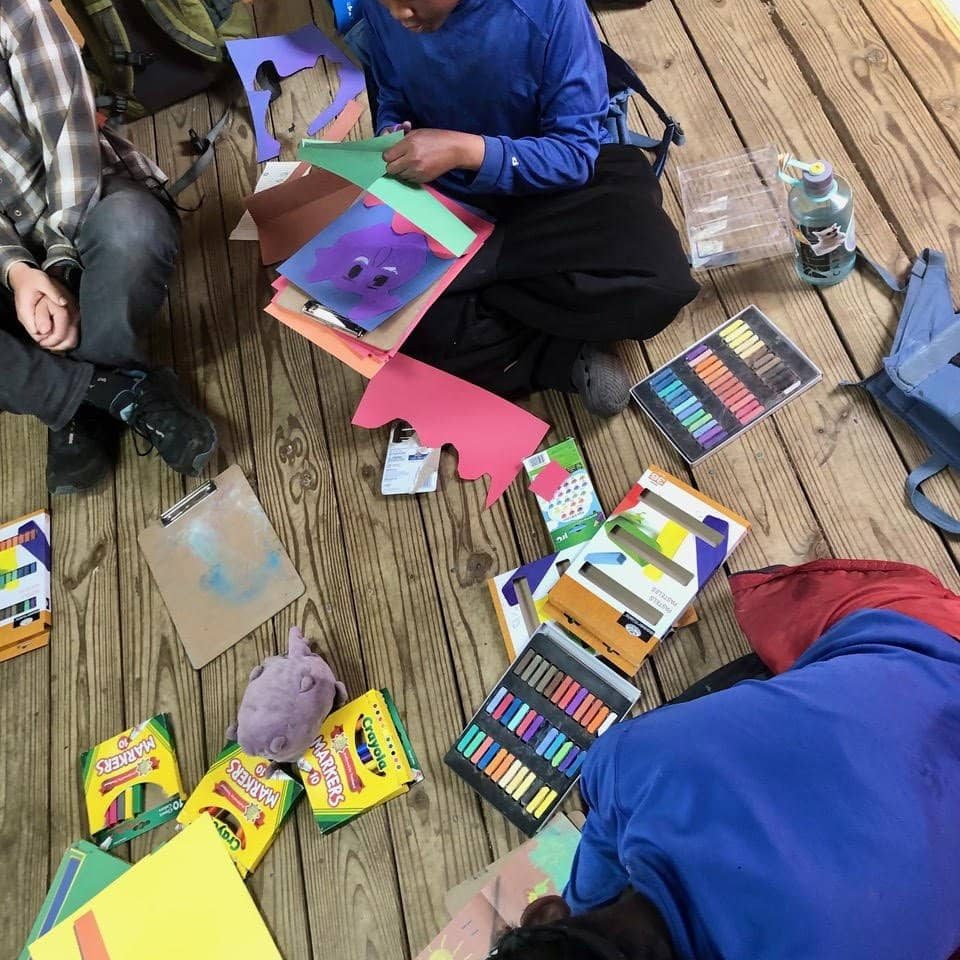Treating Technology Addiction in Teens at Trails Carolina
At Trails Carolina, we understand the detrimental impact technology addiction can have on the overall well-being and development of young individuals.
That's why we have designed our wilderness therapy program to address this growing concern and help adolescents and teens overcome their dependence on technology.
Learn what technology addiction is, how parents can recognize it, the short and long-term effects it can have on teenagers, and how Trails Carolina's individualized treatment plans and creative intervention strategies aid in combating technology addiction.

Overcoming Technology Addiction With Wilderness Therapy

Wilderness Therapy and Nature's Healing Power
- Holistic healing: The serene and supportive wilderness environment provides a break from the digital world and allows teenagers to reconnect with nature, themselves, and their peers.
- Adventure-based experiences: Engaging in outdoor activities like hiking, camping, and wilderness challenges fosters personal growth, self-esteem, and resilience, helping teens build confidence and overcome their dependence on technology.
- Therapeutic wilderness settings: Trails Carolina's experienced staff create a safe and structured environment where teens can explore their relationship with technology, develop healthier habits, and discover alternative sources of fulfillment.

Individualized Treatment Plans
- Comprehensive assessment: Each student receives an individualized treatment plan developed in collaboration with the student, the student's primary therapist, and the student's parents through comprehensive assessments, ensuring personalized treatment tailored to their unique circumstances.
- Therapeutic interventions: Skilled therapists employ evidence-based therapeutic modalities, such as Cognitive-Behavioral Therapy (CBT), Motivational Interviewing, and Mindfulness-Based Stress Reduction (MBSR), to address the underlying mental health conditions and causes of technology addiction and equip children and teens with effective coping strategies.
- Supportive group dynamics: Engaging in group therapy and team-building activities in segmented peer support groups allows teenagers to gain support, build healthy relationships, and learn from peers who share similar experiences and goals.

Creative Intervention Strategies
- Expressive arts therapy: Engaging in creative activities like art and journaling provides an outlet for self-expression, promotes emotional healing, and helps children and teens explore their emotions and underlying issues related to technology addiction.
- Mindfulness and relaxation techniques: Trails Carolina teaches mindfulness techniques and encourages digital detox, helping students develop an awareness of their technology usage, manage cravings, and cultivate a healthier balance between online and offline activities.
- Life skills development: Children and teens acquire essential life skills, such as time management, goal setting, and healthy communication, which are instrumental in managing technology use and creating a fulfilling and balanced lifestyle.
Through Trails Carolina's comprehensive wilderness therapy program, children and teens with technology addiction can experience transformative growth, develop resilience, and gain the necessary skills to overcome their dependence on technology and thrive in their daily lives.
By immersing themselves in nature, engaging in personalized treatment plans, and embracing creative intervention strategies,students can reclaim their lives from the grip of technology addiction and rediscover the joy and fulfillment that comes from real-world experiences and human connections.
What Are Technology Addiction and Obsession?
Technology addiction, or digital addiction, refers to the compulsive and excessive use of digital devices or platforms, leading to negative consequences on a person's mental, emotional, and physical health.
It often manifests as a preoccupation with screens, social media, gaming, or other digital activities, causing an individual to neglect their responsibilities and personal relationships.
Obsession with technology involves an intense and irrational focus on digital devices, leading to social isolation and a lack of engagement in real-world activities.

The Rise of Technology Dependency
In recent years, the prevalence of technology addiction has skyrocketed, with more and more individuals, particularly young people, experiencing the negative consequences of too much screen time.
Whether it's compulsive gaming, social media obsession, or constant smartphone use, technology addiction can have a profound impact on mental, emotional, and social well-being.
Recognizing Technology Addiction and Obsession in Your Child:

Recognizing signs of technology obsession and internet addiction in your child is crucial for early intervention. Here are some indicators to watch for:
- Excessive screen time: Spending an excessive amount of time on digital devices, such as smartphones, tablets, or computers.
- Withdrawal symptoms: Irritability, restlessness, or anxiety when not allowed to use technology.
- Neglecting responsibilities: Failing to fulfill academic, family, or social obligations due to excessive technology use.
- Social isolation: Preferring online interactions over face-to-face interactions with peers or family members.
- Escaping reality: Using technology as a means to escape from emotional or psychological challenges.
Short And Long-Term Effects Of Technology Addiction And Obsession In Youth and Teens
Technology addictions and obsessions can have both immediate and long-lasting effects on children and teenagers:
Short-term effects of excessive technology use:

Impaired cognitive abilities:
Excessive screen time can disrupt attention span, memory, and critical thinking skills. When young people spend hours engrossed in technology, their ability to focus on tasks at hand diminishes. This lack of focus can hinder their capacity to absorb and retain information, impacting their cognitive abilities.
Moreover, constantly shifting between different apps, games, and online content can erode critical thinking skills, making it difficult for children and teens to analyze and evaluate information effectively.
Emotional instability:
Dependence on technology can lead to mood swings, irritability, and increased levels of stress and anxiety.
The constant exposure to social media, online interactions, and virtual environments can create an emotional rollercoaster for children and teenagers. The pressure to maintain a certain image, the fear of missing out, and the instant gratification culture can contribute to heightened stress levels and emotional instability.
Children and teens may find themselves constantly comparing their lives to others' online, which can lead to feelings of inadequacy, envy, and anxiety.
Sleep disturbances:
Late-night device use can disrupt sleep patterns, leading to insomnia and fatigue. The blue light emitted by screens can suppress the production of melatonin, the hormone that regulates sleep-wake cycles.
Children and teens who engage in technology use right before bed often experience difficulty falling asleep or achieving restful sleep.
This can result in daytime sleepiness, reduced concentration, and decreased academic performance. Sleep disturbances can also exacerbate emotional and mental health challenges, further impacting overall well-being.
Poor academic performance:
Lack of focus and reduced time dedicated to studies can result in declining grades. When technology addiction takes hold, children and teenagers may prioritize their screen time over their academic responsibilities.
Excessive gaming, social media scrolling, or streaming videos can consume large chunks of time that should be allocated for studying and completing assignments.
The lack of discipline and time management skills required for academic success can contribute to a decline in grades and academic performance. Without internet addiction treatment, the child may resort to dropping out of school.
Long-term effects of excessive technology use:

Social and interpersonal difficulties:
Over-reliance on technology can lead to social isolation, strained relationships, and limited communication skills. Children and teens who spend excessive time on screens may withdraw from face-to-face interactions, preferring virtual connections over real-life connections.
This isolation can hinder the development of essential social skills, such as empathy, active listening, and effective communication. Over time, children and teens may struggle to form and maintain meaningful relationships, leading to a sense of loneliness and disconnectedness from their peers and broader social networks.
Physical health issues:
Sedentary behavior associated with technology addiction can contribute to obesity, poor posture, and musculoskeletal problems. Spending long hours sitting and engaging with screens leads to a sedentary lifestyle, lacking physical activity and exercise.
This sedentary behavior not only increases the risk of weight gain and obesity but also puts strain on the body, leading to poor posture and musculoskeletal issues such as back pain, neck pain, and repetitive strain injuries.
The physical consequences of technology addiction can have long-term implications for overall health and well-being.
Mental health disorders:
Prolonged technology addiction may increase the risk of depression, anxiety disorders, and addiction to other substances. The constant exposure to online content, social comparison, and cyberbullying can have a profound impact on a child’s and teenager's mental health.
The pressure to present a curated and idealized version of oneself online can contribute to feelings of inadequacy, low self-esteem, and depressive symptoms.
Moreover, technology addiction can serve as a coping mechanism for underlying mental disorders and emotional challenges, leading to a cycle of dependency and potential co-occurring mental health issues. Additionally, excessive screen time can disrupt dopamine regulation in the brain, increasing the risk of developing another behavioral addiction, substance abuse disorder, or other mental health disorder.
Understanding the short-term and long-term effects of technology addiction is crucial in recognizing the need for intervention and seeking appropriate treatment from a mental health professional.
At Trails Carolina, we provide comprehensive and personalized technology addiction treatment to support children and teenagers in overcoming these challenges and developing a healthy relationship with technology.
Get started today
Contact us today to learn how Trails Carolina can help your family
Trails saved my daughter’s life. Amanda is an amazing human and a brilliant therapist. I am so grateful to her, Science Steve, and the other wonderful people who could reach my daughter at a time when I could not.
Margot Lowman August 2022
Great life changing experience for our son. After becoming addicted to gaming during covid he was very depressed. At Trails he experienced the wilderness, Science Steve, learning survival skills and top notch therapy and support etc… I highly recommend! This gave our son and our family a renewed family bond full of love and excitement about his bright future.
Winnifred Wilson July 2022
Outstanding clinical work and superb staff! There’s a great culture at this company and it shows with how they engage with families/clients.
Kristin Brace June 2022
